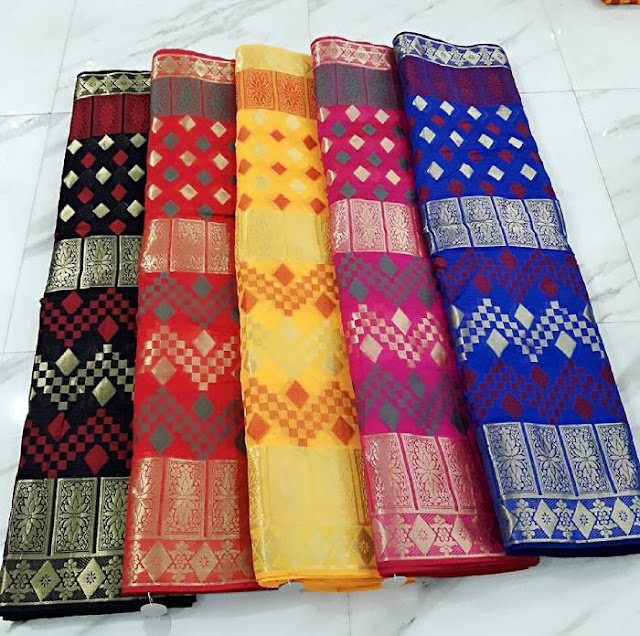What are the different types of Chanderi fabric?
Chanderi fabric is a traditional textile from India known for its sheer texture, lightweight feel, and intricate handwoven designs. It takes its name from the town of Chanderi in Madhya Pradesh, where it has been produced for centuries. Chanderi fabric is highly regarded for its elegance and is often used to create exquisite sarees, suits, and other traditional Indian attire. This article explores the different types of Chanderi fabric, their unique features, and the weaving techniques that make them so special.
Pure Chanderi:
Pure Chanderi is made entirely of handwoven cotton.
The fabric is lightweight and sheer, making it perfect for
summer wear.
It is characterized by its intricate zari (metallic thread)
work and motifs, which can be floral, geometric, or inspired by nature.
Pure Chanderi sarees are highly sought after for their
timeless elegance.
Chanderi Silk:
Chanderi Silk is a blend of silk and cotton, offering the
best of both fibers.
The addition of silk provides a subtle sheen and a luxurious
feel to the fabric.
It is often adorned with gold or silver zari work, making it
ideal for special occasions like weddings and festivals.
Chanderi Cotton:
Chanderi Cotton is made from pure cotton yarn.
It is lightweight and breathable, suitable for casual and
everyday wear.
Cotton Chanderi often features intricate handwoven patterns
and vibrant colors, making it a versatile choice.
Chanderi Tissue:
Chanderi Tissue is a variation that incorporates a sheer,
transparent quality.
Tissue fabric is woven with a combination of silk and
metallic threads.
It's commonly used for making dupattas (scarves) and
lehengas (skirt-like garments) and is popular for its shimmering effect.
Chanderi Maheshwari:
Chanderi Maheshwari is a fusion of two traditional weaving
styles, Chanderi and Maheshwar.
This fabric has distinctive borders and pallus (the
decorative end of a saree) with contrasting colors and patterns.
Chanderi Maheshwari sarees are known for their elegance and
versatility.
Chanderi Buti:
Chanderi Buti fabric is adorned with small, scattered
motifs.
The butis (motifs) can be of various shapes, including
peacocks, flowers, and geometric designs.
This type of Chanderi is known for its understated beauty
and is often used for daily wear.
Chanderi Katan Silk:
Chanderi Katan Silk is a luxurious variant woven with Katan
silk threads.
Katan silk is highly regarded for its lustrous texture and
strength.
Chanderi Katan Silk sarees are often chosen for grand events
due to their opulence.
Chanderi Brocade:
Chanderi Brocade is a rich version featuring intricate
brocade patterns woven with zari threads.
These sarees and fabrics are perfect for bridal and festive
wear, and they exude a regal appeal.
Chanderi Jamdani:
Chanderi Jamdani involves the labor-intensive Jamdani
weaving technique.
This intricate art of weaving involves creating patterned
motifs directly on the loom.
Chanderi Jamdani sarees are celebrated for their fine
craftsmanship.
Chanderi Gota Patti:
Chanderi Gota Patti features gota (gold or silver lace) work
that is intricately embroidered onto the fabric.
This embellishment gives the fabric a royal and ornate look,
making it popular for weddings.
Each type of Chanderi fabric offers a unique blend of traditional
craftsmanship and contemporary elegance. The choice of Chanderi fabric depends
on the occasion, personal style, and comfort preferences. These fabrics
continue to be a symbol of India's rich textile heritage and a testament to the
skills of the artisans who craft them. Whether you opt for pure Chanderi,
Chanderi Silk, Chanderi Cotton, or any other variant, you can be sure that
you're wearing a piece of art that has stood the test of time.
What is a Kora saree spun in Chanderi style?
A Kora saree spun in Chanderi style is a variation of the
traditional Chanderi saree, which is known for its sheer and lightweight
texture. The term "Kora" refers to a specific type of yarn used in the
weaving process. These sarees are celebrated for their elegance, intricate
motifs, and rich cultural significance.
Key Characteristics of a Kora Saree in Chanderi Style:
Kora Yarn: The distinct feature of a Kora saree is the use
of "Kora" yarn, which is a fine and translucent thread. Kora yarn is
typically made from silk or a silk-cotton blend, which imparts a delicate sheen
and a luxurious feel to the fabric.
Sheer and Lightweight: Like traditional Chanderi sarees,
Kora sarees are extremely lightweight and have a sheer texture. This makes them
an excellent choice for warm and humid climates, as they are breathable and
comfortable to wear.
Intricate Motifs: Kora sarees spun in Chanderi style are
renowned for their intricate handwoven motifs. These motifs can be inspired by
nature, including flowers, leaves, and peacocks, as well as geometric patterns
and artistic designs. These motifs are often woven using zari threads, adding a
touch of opulence to the saree.
Zari Work: Zari is metallic thread, typically gold or silver
in color, that is intricately woven into the fabric. This zari work enhances
the saree's overall appeal and makes it suitable for special occasions,
including weddings, festivals, and grand celebrations.
Versatility: Kora sarees in Chanderi style are versatile, as
they strike a balance between traditional elegance and contemporary fashion.
They can be worn on various occasions, from casual gatherings to formal events.
Cultural Significance: These sarees carry a rich cultural
and historical significance. They are considered an integral part of
traditional Indian attire and are often passed down through generations as
heirlooms.
Kora sarees spun in Chanderi style are a testament to the
exceptional craftsmanship and weaving skills of the artisans in the Chanderi
region. They continue to be highly sought after by fashion enthusiasts and are
prized for their timeless beauty and craftsmanship that has been preserved for
centuries. Whether you're looking for a saree that combines grace, tradition,
and a touch of luxury, a Kora saree in Chanderi style is an excellent choice.



.jpg)
Comments
Post a Comment